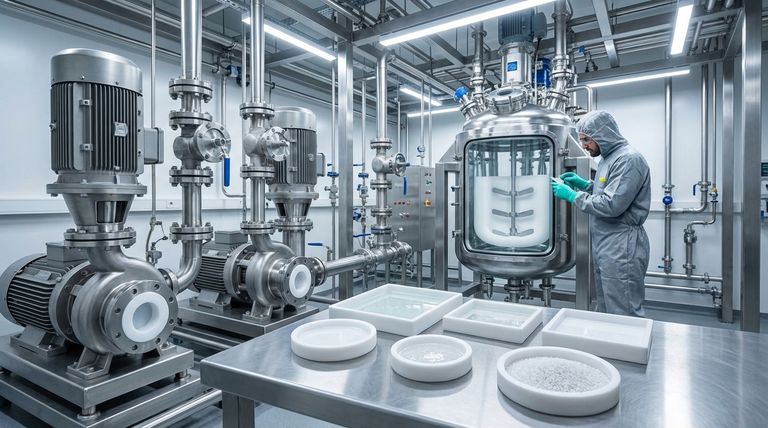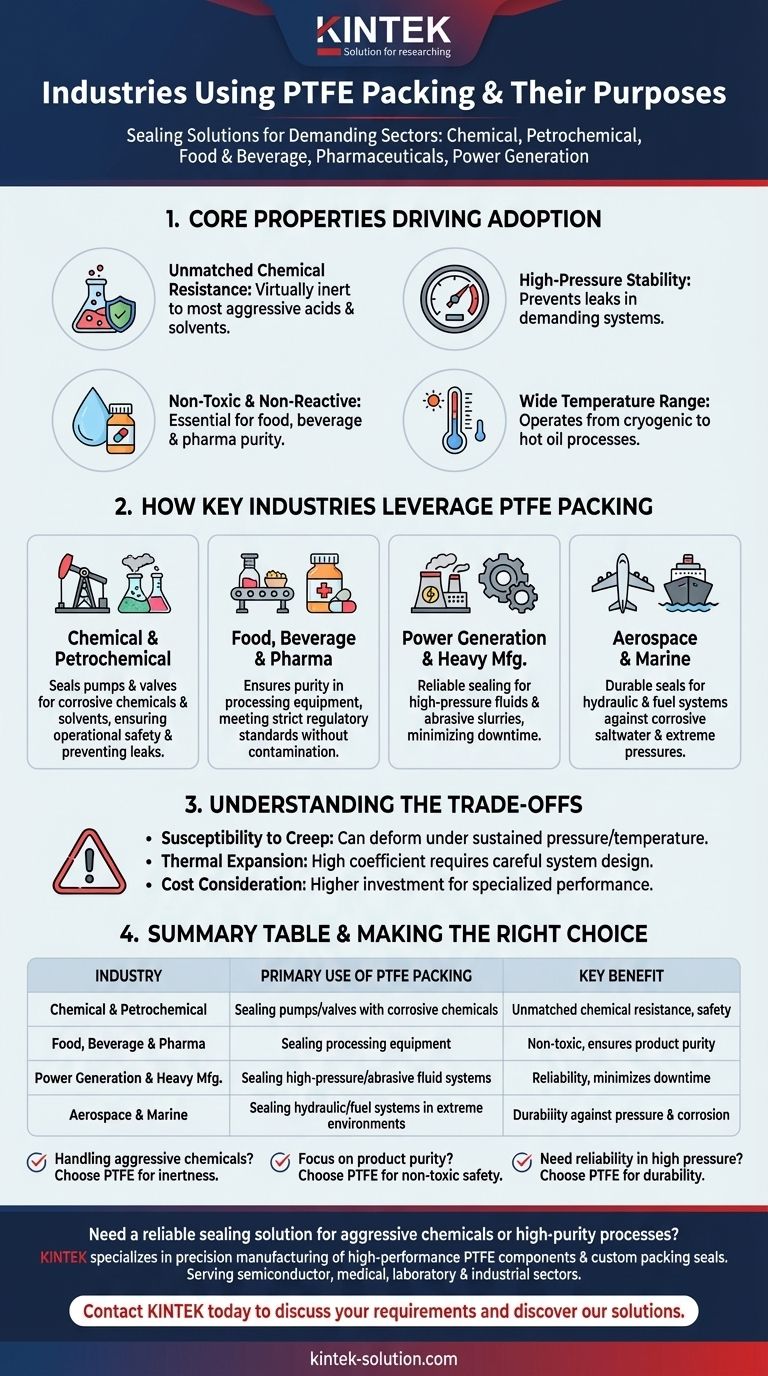At its core, Polytetrafluoroethylene (PTFE) packing is the sealing solution of choice across a wide range of demanding sectors. Industries like chemical processing, petrochemicals, food and beverage, pharmaceuticals, and power generation commonly use it to create reliable seals in equipment like pumps and valves, especially when dealing with corrosive chemicals or high pressures.
PTFE packing's value comes from a simple premise: its extreme chemical inertness and stability make it one of the few materials that can reliably seal and contain aggressive or highly pure substances without failing or contaminating them.

The Core Properties Driving Adoption
The widespread use of PTFE packing is not accidental. It stems from a unique combination of material properties that solve critical industrial sealing challenges.
Unmatched Chemical Resistance
PTFE is virtually inert and does not react with the vast majority of industrial chemicals. This makes it indispensable for sealing pumps, valves, and reactors that handle aggressive media like strong acids, solvents, and corrosive agents.
High-Pressure Stability
This material is engineered to perform under demanding physical conditions. PTFE packing effectively prevents leaks in high-pressure systems common in petrochemical plants and manufacturing facilities.
Non-Toxic and Non-Reactive Nature
For industries where purity is paramount, PTFE is an ideal choice. It is non-toxic and does not contaminate the media it contacts, making it essential for applications in food processing, beverage production, and pharmaceutical manufacturing.
Wide Temperature Range
While it has limits, PTFE maintains its integrity across a broad spectrum of temperatures. This versatility allows it to be used in processes involving both hot oils and cryogenic fluids.
How Key Industries Leverage PTFE Packing
Different sectors utilize PTFE packing to solve their most pressing operational challenges, from ensuring safety to maintaining product quality.
Chemical Processing & Petrochemicals
In this sector, equipment failure is not an option. PTFE packing is used to seal pumps and valves that manage mineral oils, solvents, and highly corrosive chemicals, ensuring operational safety and preventing hazardous leaks.
Food, Beverage, and Pharmaceuticals
Purity is the primary goal. PTFE's non-toxic and non-reactive properties ensure that it can be used for seals in processing equipment without leaching into or contaminating the final product, satisfying strict regulatory standards.
Power Generation & Heavy Manufacturing
Reliability is key in continuous operations. Power plants and paper mills use PTFE packing to seal equipment handling high-pressure fluids and abrasive slurries, minimizing downtime and maintenance.
Aerospace and Marine
These industries face extreme environmental challenges. PTFE packing provides durable, reliable seals for systems exposed to corrosive saltwater or the extreme pressures found in hydraulic and fuel systems.
Understanding the Trade-offs
While highly effective, PTFE packing is not a universal solution. Understanding its limitations is crucial for proper application.
Susceptibility to Creep
Under sustained high pressure and temperature, PTFE can be prone to "creep" or cold flow. This means the material can deform over time, potentially compromising the seal if not correctly specified and installed for the application.
Thermal Expansion
PTFE has a relatively high coefficient of thermal expansion. Engineers must account for this in system design to ensure that seals remain tight and effective during significant temperature fluctuations.
Cost Consideration
As a high-performance polymer, PTFE packing is typically more expensive than conventional sealing materials like graphite or aramid fibers. Its use is justified where its unique properties are a strict requirement, not just a preference.
Making the Right Choice for Your Application
Selecting the correct packing material depends entirely on your operational priorities and the environment it must withstand.
- If your primary focus is handling aggressive chemicals: PTFE is the default choice due to its near-total chemical inertness.
- If your primary focus is product purity and safety: PTFE's non-toxic and non-reactive properties make it essential for food, beverage, and pharmaceutical applications.
- If your primary focus is reliability in high-pressure systems: PTFE packing provides a durable and long-lasting seal that can prevent costly leaks and downtime.
Ultimately, choosing PTFE packing is an investment in stability, safety, and purity for your most critical processes.
Summary Table:
| Industry | Primary Use of PTFE Packing | Key Benefit |
|---|---|---|
| Chemical & Petrochemical | Sealing pumps/valves with corrosive chemicals | Unmatched chemical resistance, safety |
| Food, Beverage & Pharma | Sealing processing equipment | Non-toxic, ensures product purity |
| Power Generation & Heavy Mfg. | Sealing high-pressure/abrasive fluid systems | Reliability, minimizes downtime |
| Aerospace & Marine | Sealing hydraulic/fuel systems in extreme environments | Durability against pressure & corrosion |
Need a reliable sealing solution for aggressive chemicals or high-purity processes?
At KINTEK, we specialize in the precision manufacturing of high-performance PTFE components, including custom packing seals. Our expertise ensures your equipment operates safely and efficiently, preventing costly downtime and contamination.
We serve a wide range of specialized industries, including semiconductor, medical, laboratory, and industrial sectors, with custom fabrication from prototypes to high-volume orders.
Contact KINTEK today to discuss your specific application requirements and discover how our PTFE solutions can enhance your operational stability and safety.
Visual Guide

Related Products
- Custom PTFE Parts Manufacturer for Teflon Containers and Components
- Custom PTFE Parts Manufacturer for Teflon Parts and PTFE Tweezers
- Custom PTFE Sealing Tapes for Industrial and High Tech Applications
- Custom PTFE Bottles for Diverse Industrial Applications
- Custom PTFE Sleeves and Hollow Rods for Advanced Applications
People Also Ask
- How are PTFE sheets utilized in the medical field? Essential for Implants, Grafts, and Patient Care
- What advantages does ePTFE offer for industrial applications? Superior Sealing, Filtration, and Protection
- What is a key advantage of PTFE washers in terms of chemical resistance? Unmatched Protection Against Corrosives
- How do PTFE seals compare to traditional sealing materials in terms of service life? Extend Equipment Lifespan Dramatically
- What role do PTFE expansion joints play in power generation facilities? Ensure Reliability and Cut Costs
- What modifications exist for PTFE O-ring temperature performance? Enhance High-Temp Stability with Fillers
- What are the properties of PTFE gaskets? Unlock Superior Sealing for Demanding Applications
- How do PTFE expansion bellows compare to rubber bellows in terms of chemical resistance? PTFE Offers Near-Universal Chemical Resistance



















